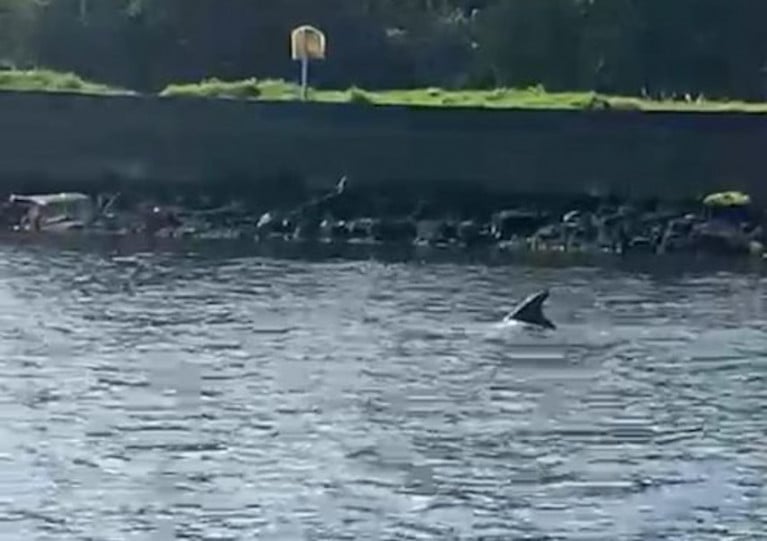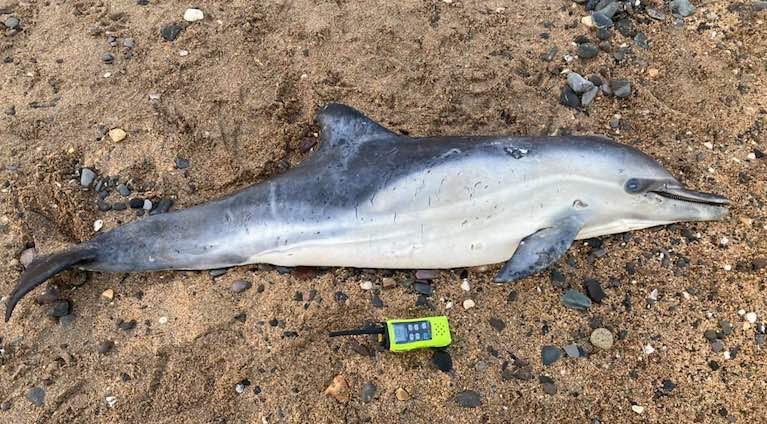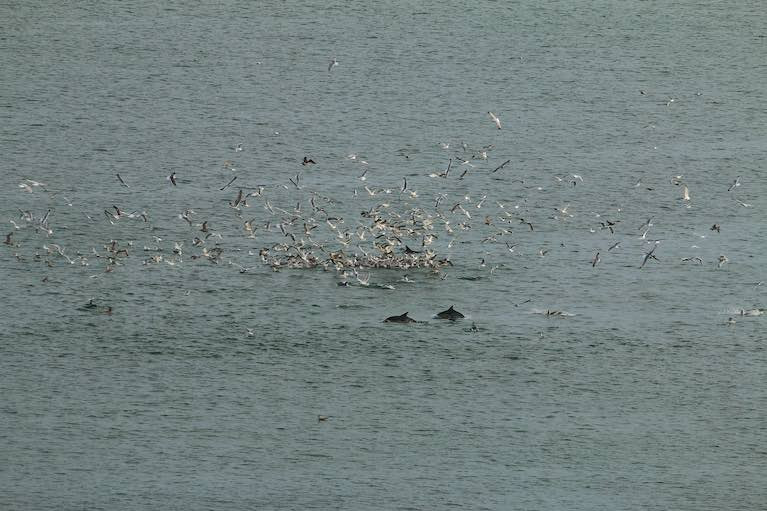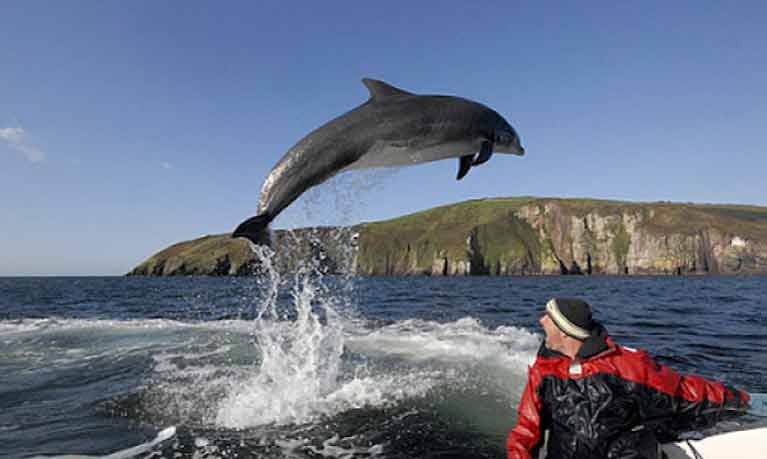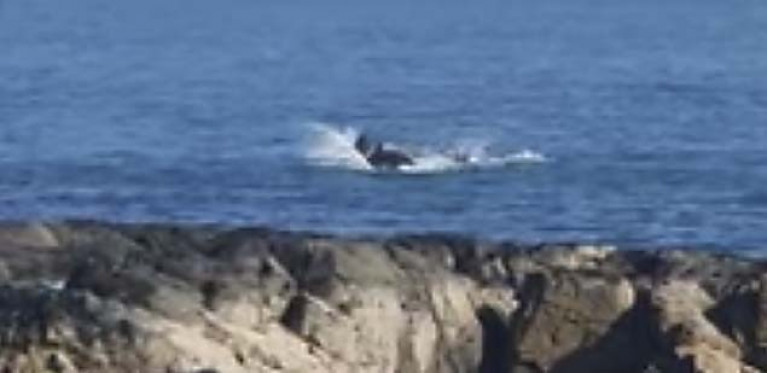Displaying items by tag: Dolphin
Ireland's Inshore Waters Lack Monitoring, Raises Concerns for Marine Life, Says New Report
A new report from Fair Seas and the Irish Whale and Dolphin Group (IWDG) has raised fresh concerns about the lack of monitoring of Ireland’s inshore waters by the state, just days before World Ocean Day this Saturday, June 8th. The Celtic Mist 2023 Scientific Report details the findings of five months of research surveys along more than 3,200 kilometres along the coastlines of counties Cork, Kerry and Clare.
The focus of researchers from the IWDG, with the support of Fair Seas, was on two large Areas of Interest (AOI), which both showed low numbers of harbour porpoise sightings. In the Southwest Coast AOI, researchers say sightings were ‘significantly lower than expected’ especially within the Roaring Water Bay and Islands Special Area of Conservation (SAC), which aims to conserve harbour porpoise under EU law. In the Loop Head to Kenmare AOI, no harbour porpoises were observed at all within the Blasket Islands SAC, which is also designated to protect harbour porpoises.
Irish Whale and Dolphin Group Science Officer and Fair Seas Partner Rebecca Dudley says theirs is the latest piece of research that points to the issue: “Harbour porpoise numbers have been shown to be in decline off many parts of Ireland in recent years. We need more research to explore the drivers behind the decline but it is undoubtedly a cause for concern, given the importance of this species to our Special Areas of Conservation. It is disappointing to see that still no management plans for these supposedly ‘protected areas’ have been developed by the Government.
“It’s vitally important that additional state resources are allocated to this kind of research. We are lucky to have a group of dedicated volunteers working with us, but effective monitoring of what’s going on in the water off our coastline is a mammoth task and beyond the scope of groups like our own.
If the Irish Government is to meet its target of protecting 30% of Irish waters with Marine Protected Areas by 2030, then monitoring must drastically increase along with robust management plans for all designated areas. The message is all the more timely given this Saturday marks World Ocean Day 2024, which has ‘Catalyzing Action for Our Ocean & Climate’ as its action theme”.
The report highlights how no humpback whales were observed in the survey areas in the southwest at all, which tallies with reports from the IWDG’s Sighting Scheme of sightings being recorded further north, off the Sligo and Mayo coasts.The number of large baleen whales recorded were low in both areas surveyed, while eight sightings of fin whales occurred within the Loop Head to Kenmare section.
A total of 462 sightings of large marine animals or megafauna were recorded during nine surveys conducted between April and September last year. Some of the results include:
- 48% of those seen were common dolphins
- 22% were grey seals
- 12% were minke whales
- 25 sightings of bottlenose dolphins
- 1 blue shark was spotted
Researchers have paid tribute to the 66 volunteers who assisted in last year’s survey, including skippers and first mates. The work is being expanded in 2024, as Rebecca Dudley explains: “We have now begun our latest round of surveys which will continue right through the summer and into September. Celtic Mist will be taking crew and volunteers all along the west coast of Ireland, from Bantry in Cork up to Killybegs in Donegal with quayside events taking place at various locations. It’s an incredible experience but it’s also an important project in the context of understanding what’s happening to marine life around the Irish coast”.
Celtic Mist was donated to the IWDG in 2011, by the family of Ireland’s former Taoiseach, Charles J. Haughey. At 17m, Celtic Mist has become the IWDG’s flagship vessel and can accommodate eight people. It has surveyed Irish inshore and offshore waters since 2012, successfully circumnavigating Ireland on several occasions and sailing to Iceland in 2018.
French Government Issues Temporary Ban on Fishing In Bay of Biscay to Protect Dolphins
France has announced a temporary ban on almost all commercial fishing in the Bay of Biscay to protect dolphins.
As Agence France Press (AFP) reports, the restriction extending from Finistere in Brittany to the seas off the Spanish border will last until February 20th and will affect all vessels over eight metres long, regardless of origin.
It is expected to affect up to 450 French vessels, and the French government has promised supports for its fishing fleet and seafood sector.
The French senior administrative court, the State council, had ordered the restriction last year after environmental groups called for better protection.
AFP reports that CIEM, a scientific body that tracks North Atlantic ecosystems, has for years urged a winter pause for some indiscriminate fishing techniques, and has estimated that around 9,000 dolphins die each year off the French Atlantic coast as a result of accidental capture.
French fishermen have criticised the move and have said the compensation offered by the French government is insufficient.
The French National Fisheries Committee (CNPMEM) has criticised what it calls "extremist NGOs", claiming that the marine mammals are "not endangered".
Fish processing companies estimate they could lose more than 60 million euros due to the temporary ban.
The ‘spatial squeeze’ is an issue that has been coming increasingly to the fore in recent months as more concern is expressed about the pressure being exerted by offshore wind farm developers for planning approval of their proposals.
There are so many new policies being introduced to the marine environment, and so many calls for development that yet another has been highlighted by the Irish Whale and Dolphin Group.
This is Deep Sea Mining, about which it has published a review of the possible impact on whales and dolphins. It says such mining should be banned in Ireland.
Listen to the Podcast here.
 Deep Sea Mining and the possible impact on whales and dolphins
Deep Sea Mining and the possible impact on whales and dolphins
RNLI & Cork Harbour Boats Safely Escort Dolphins Out of Shallow Water at Crosshaven
Four boats, including a Port of Cork RIB, a kayak and the local RNLI, were involved in Tuesday morning's dolphin rescue in Crosshaven in Cork Harbour that eventually saw two small dolphins escorted safely back to sea.
The dolphins were accompanied out of the shallow water in the Crosshaven Harbour, four or five times, as the tide was going out, making it a race against time to have the mammals out at sea before the water ran out.
RNLI spokesperson Jon Mathers said the dolphins were herded out of the Harbour a number of times before eventually managing to direct the dolphins out past Currabinny.
"The boats formed a line that stopped the dolphins coming back in. Then as the tide was going out, the boats had to turn back, but the two boats drove them out a bit further and the dolphins are safe, for now."
The ECHO has more on this here
 The dolphins are encouraged out into deeper water in Cork Harbour
The dolphins are encouraged out into deeper water in Cork Harbour
Concern for Carlingford’s Resident Dolphin Prompts Investigation After Photos Show Cuts on Its Back
Photos that emerged last month of cuts on the back of Carlingford Lough’s resident dolphin have prompted an investigation, as Independent.ie reports.
Finn the dolphin has become a popular sight off Carlingford and Greenore on Co Louth’s Cooley Peninsula since taking residence in the area more than a year ago.
But concerns for his welfare were raised last month after photos surfaced on the Facebook page for Carlingford Lough and The Cooley Peninsula showing what appeared to be a deep gash on his back below his dorsal fin.
While more recent images of the dolphin show that his wounds are healing, the general public have been urged to keep their distance from the animal.
A spokesperson for the National Parks and Wildlife Service (NPWS) said: “We have not had a chance to fully investigate the reported injuries.
“However, we are aware, as is the Department of Agriculture, Food and the Marine, An Garda Síochána and Louth County Council and an investigation is ongoing.”
The Irish Whale and Dolphin Group’s Pádraig Whooley told Echo Live that curious dolphin-watchers should “stay out of the water and enjoy the spectacle from the shore”.
He added: “The more people engage with this animal, the more people turn him into a local pet [and] the more we are encouraging this aberrant behaviour. It is not natural for a…dolphin to seek out human company.”
Dolphin in River Boyne Excites Drogheda Locals
The Irish Independent covers the excitement among the denizens of Drogheda after a dolphin swimming up the River Boyne paid an unexpected visit to the town.
Reports of a dog in the water yesterday morning (Thursday 22 April) turned out to be wide of the mark when Boyne Fishermen Rescue and Recovery encountered the “medium-sized dolphin” in the River Boyne at the Upper Mell slipway, just east of the town centre and some 7km from the open sea.
The Irish Whale and Dolphin Group says the marine wildlife is likely to be a bottlenose and called for the public to contact it with any images or reports of further sighings.
While there is no immediate cause for concern, dolphins are saltwater animals and can develop serious kidney and skin problems with prolonged exposure to freshwater environments.
Last Wednesday (January 6th) Bangor Coastguard Team answered a report of a cetacean washed up on Crawfordsburn Beach on Belfast Lough. It was identified on social media as a Common Dolphin and it was suggested that the find should be reported to the Irish Whale and Dolphin Group.
The sandy beach lies on the south shore of the lough and is measured by NIDirect Government Services as having excellent water quality.
The team took measurements, photos and completed the relevant paperwork before returning to the coastguard station.
Feeding Frenzy of Dolphins as Warm Water Anchovies Shoal off South Coast
Warm water anchovies and sprat are tempting pods of dolphins, fin whales and seabirds close to the south coast this week, with feeding frenzies reported in outer Cork harbour.
An estimated 50 to 60 dolphins have been sighted by several eyewitnesses off Myrtleville and Fountainstown and Roche’s Point over the past week.
The marine mammals have been joined by kayakers who have filmed the marine mammals flipping and jumping as they tuck into the “bait balls”.
“We’ve never seen dolphins in such large numbers before at this time of year,” Donal Kissane of Myrtleville said.
“They are particularly close at high tide, and it has been wonderful to watch,” Mr Kissane said.
Carrigaline resident Derek McGreevy photographed the pods from outer Cork harbour and said he estimated there were 50 to 60 common dolphins at times, with gannets competing for the fish.
Dolphins this morning feeding on a bait ball of fish at fountainstown cork @echolivecork @CorkSafetyAlert @CorkHarbourWX @IrelandAMVMTV @WildlifeMag @whalesorg @IrishTimes @IrishSunOnline @irishexaminer @RTEOne @WILDLIFEP pic.twitter.com/J5isa2tGdk
— Derek 1968 (@1968_derek) December 2, 2020
The shoals of tiny fish are also drawing in fin whales off the south-east coast, with almost daily sightings of the second largest creature on the planet, according to Padraig Whooley of the Irish Whale and Dolphin Group (IWDG).
The abundance of anchovies – a warm water species with higher value now, used in pizza toppings and pasta dishes – has been described as “astonishing” by Dr Kevin Flannery of Dingles’s Mara Beo aquarium.
Small numbers of anchovies have been identified in Irish waters before, with the first record being off Ventry, Co Kerry, in 1870. The fish also appeared off west Cork last January.
“We thought of them as vagrants, whereas this past week has seen astonishing numbers,” Flannery said.
The Marine Institute said that it was aware of anchovies appearing in these waters in small quantities since 2003, and has identified them up as part of its periodic groundfish surveys.
Mr Whooley said that the IWDG had received sighting reports of marine mammals this week extending from Kinsale to Roche’s Point to Myrtleville and up the river Suir estuary.
“It’s not unusual for this time of year, but it is still wonderful that people can see them so close to the coast, and from their houses in Dunmore East,” he said.
At least 1,000 tonnes of anchovies landed into Dingle last week were sent to fish meal, as there are no markets for anchovies in Ireland.
The IWDG has criticised this, stating that there is “no excuse for removing the base of our inshore food chains”, which could have long term catastrophic impacts on entire ecosystems.
Minister for Marine Charlie McConalogue is currently appealing a recent High Court judicial review which overturned a ban on trawling by vessels over 18 metres inside the six-mile limit.
Dingle Dolphin Concerns are a Reminder that Baltimore Pioneered the Special Dolphin Concept
There’s concern in West Kerry and worldwide among his fans and friends that Fungie the Dingle Dolphin is becoming depressed. He is being made gloomy by the lack of company and an audience for his usual summer season starring role, which would be playing to empty houses were he to put it on under the current Lockdown. Thus the word is that Dingle is organising a rota of boats to keep him company from time to time, but whether that will be remotely as good as the usual capacity crowd he gets in high summer remains to be seen.
Whale and dolphin specialists may sniffily tell us that it’s completely unnatural and maybe unhealthy for a lone bottlenose dolphin like Fungie to develop such a special relationship with a waterborne enraptured audiences of adoring fans. But if you’ve ever been in the midst of the milling fleet of boats as it wheels frenetically around Fungie as he goes through his many routines, you’ll realise that here is one very intelligent rockstar putting on a life-enhancing performance, and the fact that he has been joyously doing it since 1983 suggests that ill-health – whether physical or mental – had not been on the agenda until the current freakish situation.
In terms of rockstar/audience interaction, it certainly beats the experience being at Electric Picnic or Slane Castle on a damp midge-ridden evening every time. Our own best experience of it came after the Dun Laoghaire to Dingle race way back in 1995, when we joined the gathering fleet in the afternoon sunshine out in the harbour mouth, and suddenly he was among us. Fungie was leaping and pirouetting with such style and speed and enthusiasm that we’re convinced he went straight over our 35-footer between the mast and the backstay, because we certainly were very close indeed to the godlike presence.
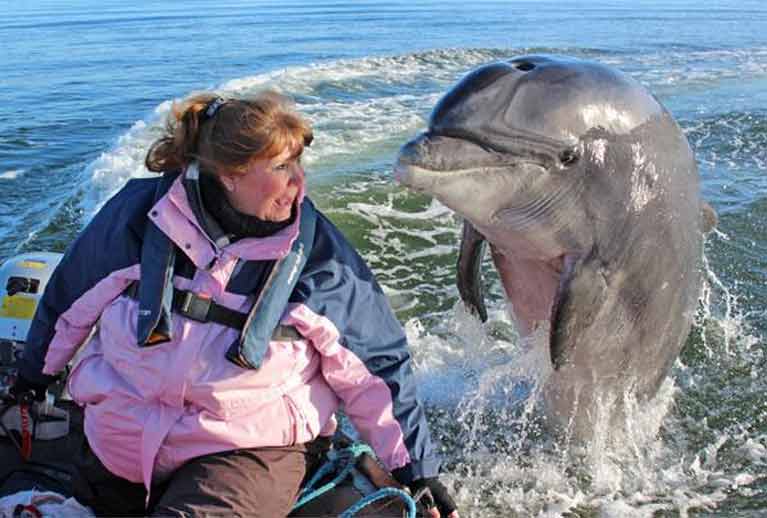 Well hello there…….close encounters with Fungie are never forgotten. Photo Dingle Dolphin
Well hello there…….close encounters with Fungie are never forgotten. Photo Dingle Dolphin
In the heightened mood, people become semi-demented, and one of our crew – he had better remain nameless – jumped in with the group already in the water trying to share the Fuungie experience to the uttermost. Some greater power seems to protect it all, because so far as is known, none of the head-cases who jump in has yet been struck by the flailing propellors of the heaving fleet.
So if there is one special early exemption from lockdown, it should be made for the Fungie experience in Dingle. He has taught us a lot, so much so that the very idea of eating whalemeat now seems like cannibalism, while it has been shown that the bonds that form from special relationships between dolphins and humans are not to be trifled with.
Twenty years or so ago, a “scientific” international research group formed an intimate bond with a dolphin, and when the experiment was over they simply went away and left him on his own in the sea. Becoming terminally depressed after the ending of the fun they’d had, he took his own life by descending to the seabed and not coming up for air.
That now seems an absolute disgrace caused by contemptible thoughtlessness, and the fact that we see it as such is heightened by our awareness of Fungie. This responsiveness to the sensitivities and fascination of special sea creatures is relatively new, for it’s now generally forgotten that very many years ago, Baltimore in West Cork was home to a semi-resident dolphin or pilot whale known as Albert.
This would have been in the 1920s to 1940s period, and Albert aroused mixed feelings. He would escort boats in and out through the harbour mouth, and when a visiting cruising boat had anchored off the village, he would occasionally rub up against the hull, supposedly to clear himself of sea lice, though his intentions were equally likely to have been amorous.
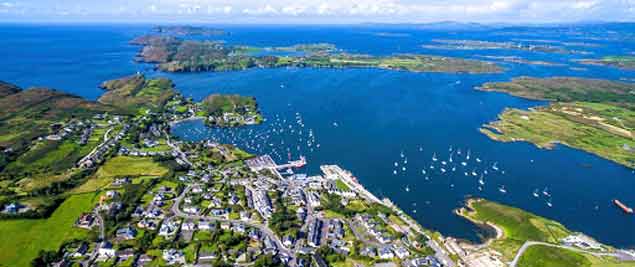 High summer in Baltimore, West Cork. Nearly a hundred years ago, Baltimore’s resident dolphin or pilot whale - known as Albert - was rumoured to have moved anchored cruising boats from their carefully selected location off the village (foreground) all the way across the harbour to Sherkin Island during the night. Photo: Tom Vaughan
High summer in Baltimore, West Cork. Nearly a hundred years ago, Baltimore’s resident dolphin or pilot whale - known as Albert - was rumoured to have moved anchored cruising boats from their carefully selected location off the village (foreground) all the way across the harbour to Sherkin Island during the night. Photo: Tom Vaughan
Another of his tricks was to trip the anchor of carefully-anchored boats. Nowadays when it only needs a quick jab of astern with the auxiliary engine to dig the anchor in again, that wouldn’t be too much of a hassle. But in the old days when many craft were engine-less, it was a real pain to have to stick up some sail to make some way astern.
However, that was as nothing compared to the experience of at least two visiting crews, who went to sleep with their boats anchored serenely close in off Baltimore and woke in the morning to find themselves anchored over at Sherkin. Albert had taken it upon himself to move them quietly across Baltimore Harbour.
Nowadays people would be queuing up and paying good money for the extraordinary experience of having their boat moved almost a mile during the night by a friendly hyper-clever big dolphin. But back in the ancient times, visitors to Baltimore were earnestly warned of the hazards posed by Albert, he was looked on as very much of a mixed blessing, and most certainly not as a very special visitor attraction.
Dolphin & Porpoise Sightings on Belfast Lough
People may not be able to go to sea at present due to the Government restrictions but dolphins and porpoises clearly can’t read and so we are seeing reports of their activity in Belfast Lough.
Recent sightings include about eight dolphins (likely bottlenose) off Orlock Point near Groomsport on the North Down coast, heading north-west, and of harbour porpoises at Black Head opposite on the Co. Antrim coast.
You can watch the dolphins in the video below
A dozen porpoises were sighted in calm conditions, feeding, travelling and resting and heading northeast.
And had boat owners been able to go down the pontoons at Bangor Marina last Saturday they might have had a treat. The duty berthing master watched a mother otter and two pups playing on a pontoon.


























